This Is Your Song: Jeff Tweedy's New Book Makes Us Think About How We Connect With Our Favorite Music
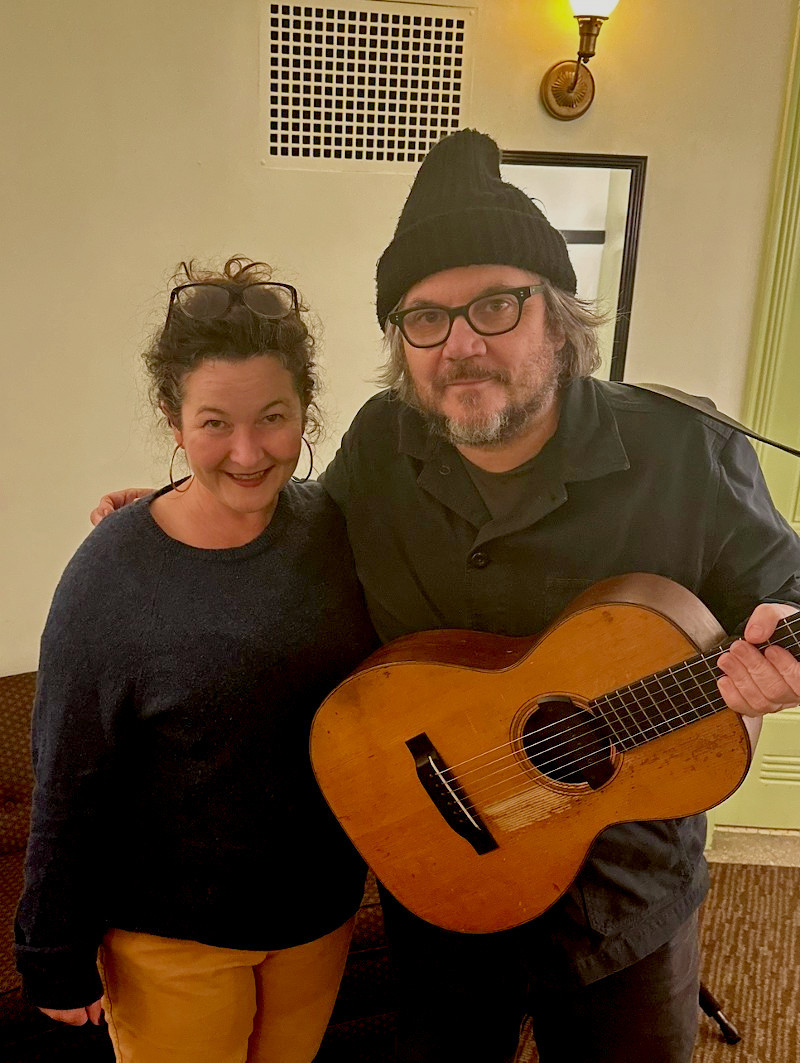
Back in 2009, I actually heard Wilco for the first time.
It’s not that I didn’t know the band’s music, but it was the first time I had developed an emotional connection to one of their songs.
It was “You and I,” a heartwarming duet with Feist from the band’s self-titled album. The track addresses two lovers trying to preserve a relationship as Wilco frontman Jeff Tweedy sings, “You and I, we might be strangers / However close we get sometimes / It’s like we never met.”
While I’ve never met Tweedy and or any of the other Wilco members, “You and I” emanates a comforting familiarity in terms of its memorable lyrics, bittersweet harmonies, and smooth bassline.
There’s an unexplainable pull I feel to it, and it’s something Tweedy easily masters after nearly three decades of writing Wilco songs.
“I’m much more fascinated by the blurry area between a song and the mind that receives it, puts it back together in a shape that fits their own life, and allows the heart to take ownership,” writes Tweedy in his latest book, World Within a Song: Music That Changed My Life and Life That Changed My Music.
That statement nicely encapsulates the key takeaway from Tweedy’s third book, which highlights the memorable connections—both positive and negative—he’s made with 50 different songs throughout his life.
Much Ado: U-M Theatre's "Imogen Says Nothing" bears bizarre and haunting moments
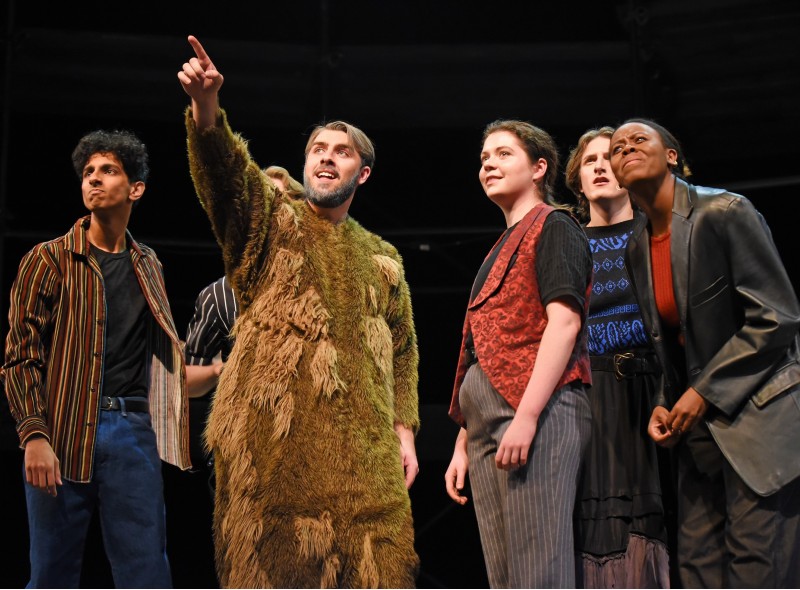
U-M theater professor Malcolm Tulip has long established a reputation for bringing challenging, provocative productions to local stages, going back to his days as a director (and performer) at the sadly defunct Performance Network Theatre.
So it was no surprise to find Tulip at the helm of the U-M theater department’s strange, darkly haunting production of Aditi Brennan Kapil’s Imogen Says Nothing, mounted at the Power Center this past weekend. Inspired by a character, Imogen, who has no lines, but is nonetheless mentioned in the first folio edition of Shakespeare’s Much Ado About Nothing, the play imagines a woman who fights to perform on stage in Shakespeare’s time, when only men played theatrical roles (by law!), and campaigns to appear in the first written version of the play, too.
Plus, there are bears.
Imogen is a former bear (!) who has escaped the bear-baiting arena next to the Globe Theatre, which hearkens back to one of Shakespeare’s most famous stage directions, in The Winter’s Tale: “Exit, pursued by a bear.”
While enmeshed with a troupe of actors, Imogen confronts her former peers, and the line that encapsulates the play, “It is a lonesome thing to be absent,” further expands its meaning.
New Day Rising: Penny Seats' "Sunrise Coven" tackles the opioid epidemic and second chances
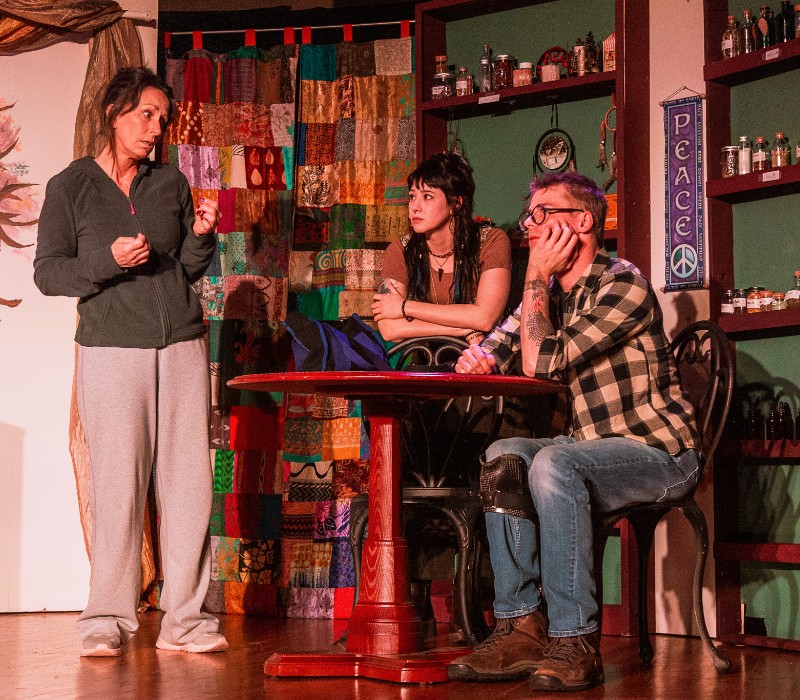
It’s no secret the United States has a drug problem, and painkillers are at the top of the list. The Penny Seats Theatre Company’s Sunrise Coven tackles that conversation and then some.
Written by Brendan Bourque-Sheil, the show takes place in Buckstop, Texas, a small town where everyone knows everyone else and all their business. We meet Hallie Heaton (Jeannine Thompson), a diabetic nurse practitioner who has wound up in the hospital because she overdosed on Oxycodone. The doctor taking care of her is Annie (Inchai Reed), who reveals she has based her entire career on Hallie and sees her as an idol.
Hallie gets the unfortunate news that due to her OD, she has lost her nursing license. On top of that, her eyesight is starting to go bad and she's having visions she can’t explain.
The Folds of Space: EMU’s "A Wrinkle in Time" was a quick-paced journey for the whole family
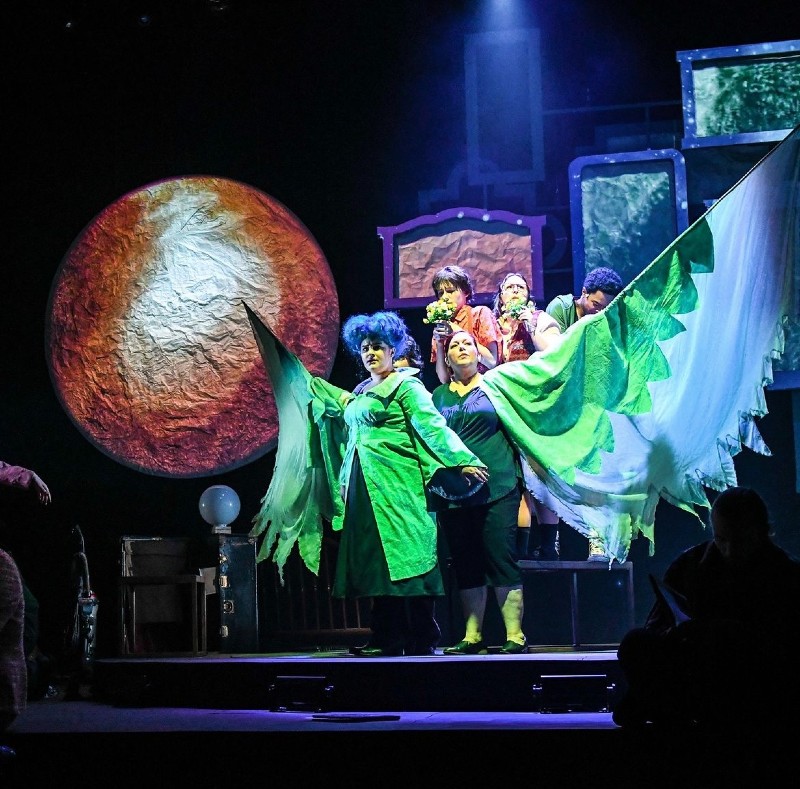
Audiences at Eastern Michigan University’s Liberty Theatre traveled through time and hopped across realms over the weekend.
Tracy Young’s adaptation of A Wrinkle in Time, based on the book by Madeleine L’Engle, was a fast-paced family adventure that follows Meg Murry (Annabelle Rickert), an outcast at school who has trouble fitting in and making friends. The only people she’s close to are her mom (Amanda Bates) and her spunky younger brother, Charles Wallace (Josi Middaugh). Meg’s father (Jonathan Bias) has been missing for quite some time, and she’s still determined to figure out what happened to him.
One day, Charles Wallace convinces Meg they should check out the haunted house at the bottom of the hill. On the way they run into Calvin (Chandler Graham), who joins the siblings. At the house, they meet the eccentric Mrs. Whatsit (Brookelyn Hannah), Mrs. Who (Maura Doyle) who only talks in quotes, and the ominous voice of Mrs. Which (Laney Bass) whose presence is everywhere but isn’t seen by the kids. Turns out they are magical beings that can travel through space and time via a tesseract, a form of traveling by folding the fabric of space and time.
"Things Hidden Since the Foundation of the World" Explores the Challenges of Information Overload and Ubiquity

When you Google the name of the Javaad Alipoor Company’s theatrical production Things Hidden Since the Foundation of the World, you learn this grandiose mouthful of a title was originally used by French philosopher René Girard for a book he wrote.
To learn a little more, you might read a brief overview of Girard’s mimetic theory, which posits that humans don’t know what to want, so we look to others and imitate their desires.
Wait. You came here for a review of Alipoor’s show of that name presented by UMS this week at the University of Michigan’s Arthur Miller Theatre, right? Sorry!
Yet this classic Digital Age digression demonstrates precisely what’s at the heart of Alipoor’s innovative 90-minute show, which was written with Chris Thorpe. Though we know, and are constantly reminded, that almost any information we could possibly want is now at our internet-addicted fingertips. In response, we go online like a reflex with the idea that “facts” provide us with understanding, or that the two things are somehow synonymous, is a dangerous illusion.
Using the unsolved, brutal 1992 murder of Iranian pop star (and refugee) Fereydoun Farrokhzad—who fled Iran during the Islamic Revolution in 1979—as the show’s base of operations, Alipoor integrates video and an onstage, fictional true crime podcast (as well as some nifty theatrical sleight of hand) to explore the case, and more broadly, the link between contemporary technology and politics.
My Deer Heart: Jeff Daniels' "Escanaba in Love" tracks love and laughter at an Upper Peninsula hunting camp
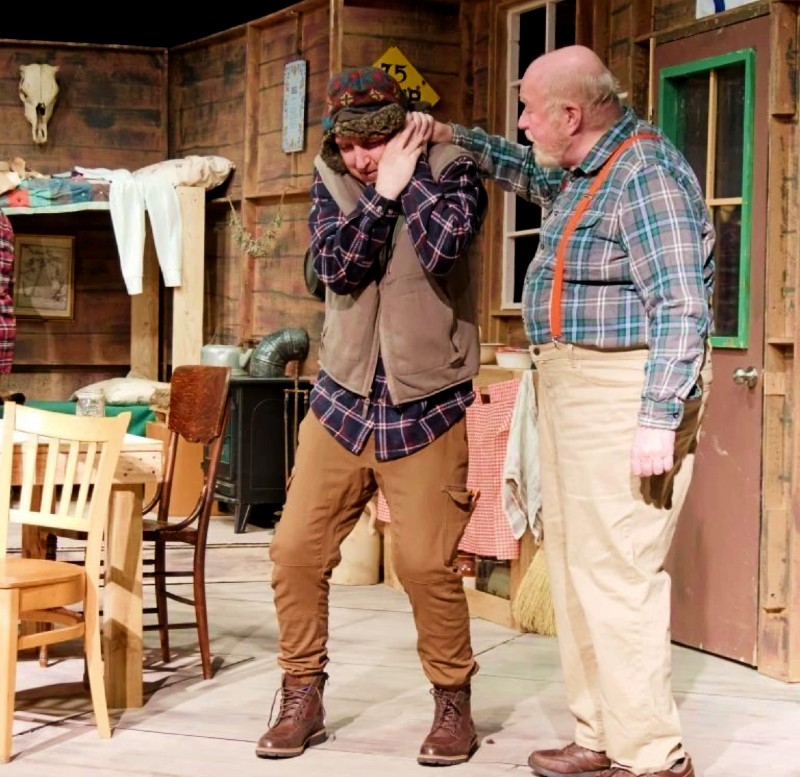
Michiganders know the opening day of deer season is essentially a holiday for many folks, and that's definitely the case in Jeff Daniels’ Escanaba in Love, which PTD Productions is staging at the Riverside Art Center in Ypsilanti.
In this prequel to Daniels' hit show Escanaba in Da Moonlight, the audience is transported to the small Western Upper Peninsula town where the infamous Soady Deer Camp resides. It's 1944 and multiple generations of Soady men have been coming to this cabin in the woods to hunt.
Family patriarch Alphonse Soady (Larry Rusinsky) is convinced he shot the biggest buck to ever walk the woods even as Albert Soady Sr. (Mark Bernstein) is certain Alphonse is losing his mind.
In comes "Salty" Jim Negamanee (Gary Lehman), who walks with a gimp due to a supposed boat accident and an alcohol problem. They all talk about the excitement of opening day and who will get the big buck this year.
Public and Personal Policies: Airea D. Matthews’ autobiographical poetry collection questions economic theory amid the realities of poverty and violence
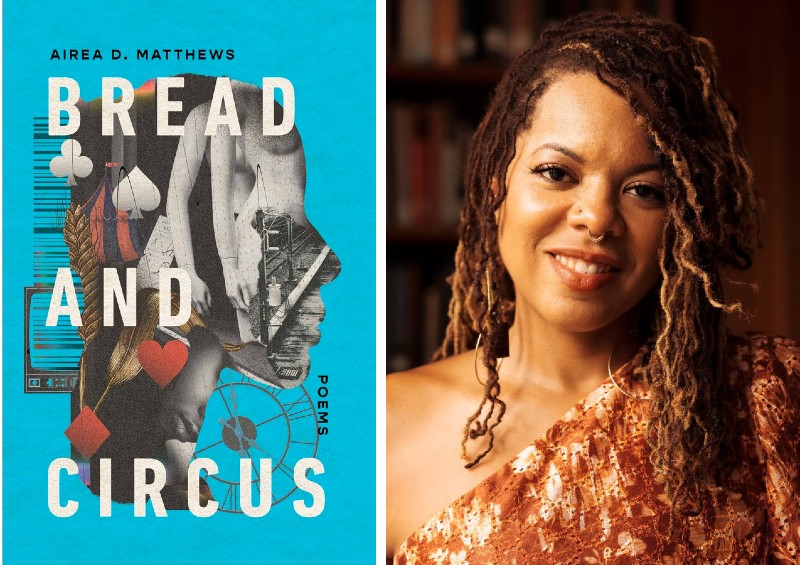
Necessity and amusement. Sustenance and transaction. Security and turmoil.
Airea D. Matthews’ autobiographical poetry collection, Bread and Circus, brims with contrasts. One situation or item is paired with another to show a lack or miscalculation. The poems hover on a precipice, even as the guests “…watch a lovely commodity / reluctantly agree to her own barter.”
Early in the book, the poems witness a shotgun marriage, and the family grows in the subsequent years. Making ends meet results in how “Papa despised the vestiges of a hand- / out” – and especially “one specific symbol of his failure – corn.” Over time, the father’s drug addiction causes trauma, along with broken promises like, “I owe you a bike, right?” though it never materializes. These memories stick in the poet’s mind, as the poet reflects on a past hurt:
Greetings From Hell: The devil is in the details in the University of Michigan’s "Orpheus in the Underworld"
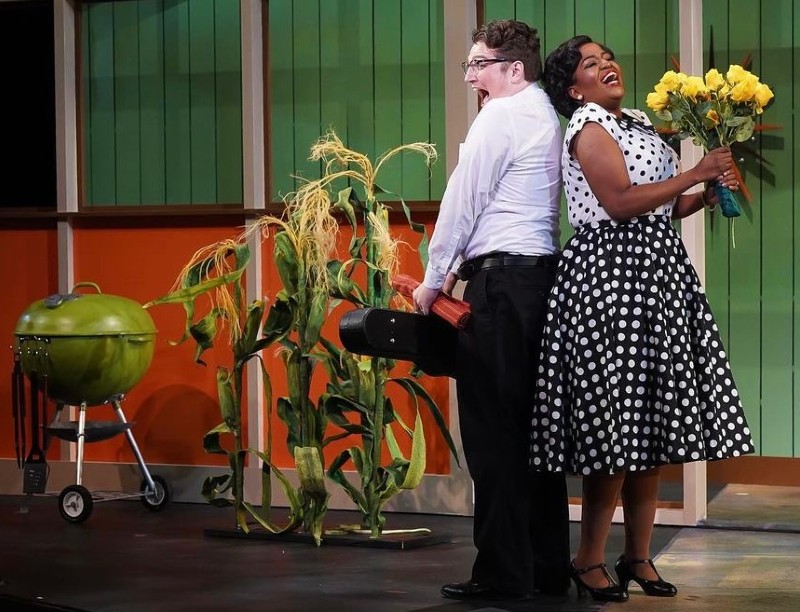
The classic Greek myth of Orpheus and Eurydice is everywhere in the performing arts right now. The play Eurydice, written by award-winning playwright Sarah Ruhl, is being performed on stages all over the U.S. and was adapted into an opera by the same name, and the Broadway smash hit musical Hadestown, which won eight Tony awards including Best Musical, is still going strong in New York City, has a thriving national tour, and is opening on the West End in 2024.
But before all of that, French composer Jaques Offenbach created Orphée Aux Enfers, or Orpheus in the Underworld, in 1858, and U-M's Department of Voice has put a whole new twist on it. (I went to the Thursday evening performance, and the actors I mention here may be different than those seen by others due to the double casting of the lead roles.)
Beauty and the Bard: Concordia University’s "Shakespeare in Love" is a tale of love, poetry, and laughs

Everyone knows Shakespeare's classic Romeo and Juliet. But how did that play come to fruition and what was Shakespeare’s inspiration for the tragic tale?
Concordia University's production of Shakespeare in Love, a play adapted by Lee Hall and based on the screenplay by Marc Norman and Tom Stoppard, takes us back to the days when William Shakespeare was a struggling poet and bard.
William Shakespeare (Corey Flanders) has a bad case of writer’s block. It’s even more dire that he owes two producers a script for a new show, so the pressure is on. His best friend and fellow bard, Kit Marlowe (Caleb Gross), has agreed to help him find some inspiration and has even helped edit a few of his lines. In this day and age, more people are seeing and loving shows written by Marlowe rather than Shakespeare.
Slowly but surely Shakespeare starts building the script for his famous Romeo and Juliet. He prematurely tells the producers he’s got something in the works and they run with it, holding auditions. At this time in history, women were not allowed to act on stage and all female roles were played by men in drag.
Bold Conversations: Theatre Nova's "What the Constitution Means to Me" explores big issues on a small stage
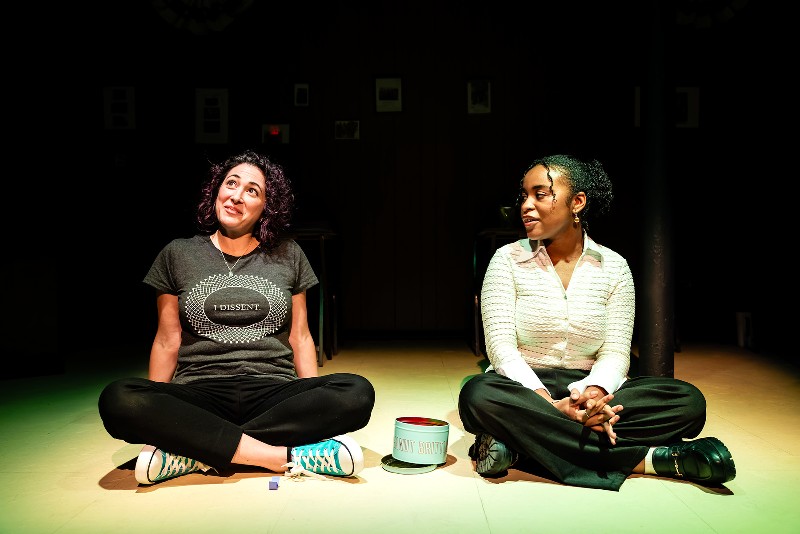
New York Times theater critic Jesse Green hailed Heidi Schreck’s play What the Constitution Means to Me as “not just the best play on Broadway, but also the most important.”
Here was a theater piece that grappled with real issues while also being funny and intimate. The playwright played herself, offering her story as a template for long-simmering grievance.
Schreck’s play was not the usual Broadway fare. The set was simple, the approach was friendly and beguiling—and then, quietly, outraged. Schreck used her own story to explore what the U.S. Constitution got right, where it failed, and its impact on the lives of everyone.
The play opened on Broadway in 2018, in the wake of the Me Too movement that put a bright spotlight on male privilege, violence, and smug disregard for half of the human race.
Yes, the play is about the Constitution but its real subject is a dawning feminism and how that hallowed document has helped and hindered the freedom of women and minorities over the last 235 years.
Theatre Nova is the perfect venue for Schreck’s play. It’s a small theater in the heart of a great university town, a place where arguments about the Constitution really matter. Nova is presenting What the Constitution Means to Me through November 9.


































